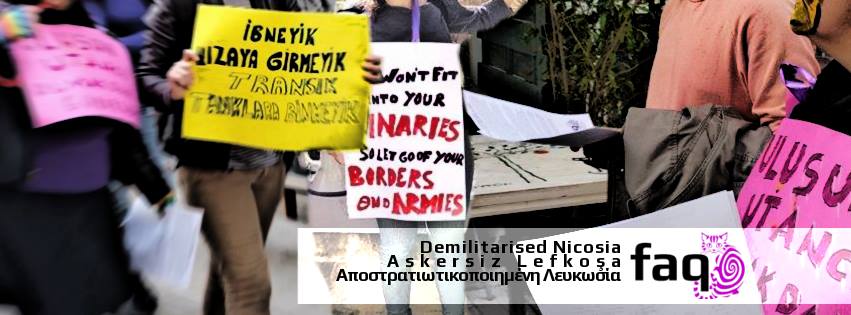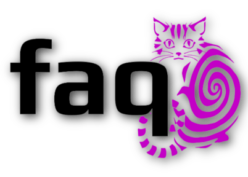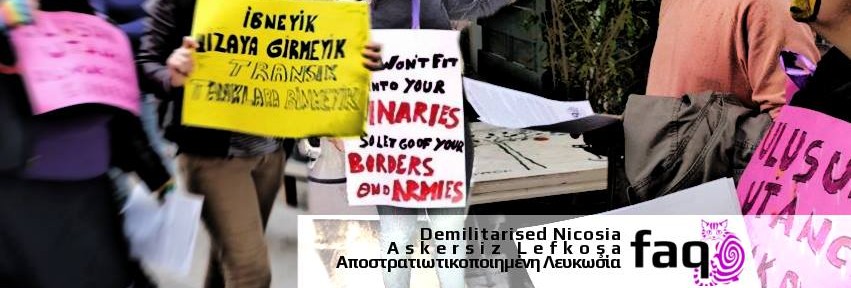The statement regarding our participation in this year’s Demilitarised Nicosia march:
WE WON’T FIT INTO YOUR BINARIES
SO LET GO OF YOUR BORDERS AND ARMIES

The auspices of militarism and nationalism are nothing strange to our everyday lives. We encounter the waving flags as we drive past a school, a church, roundabouts, mountains, to the remnants of a military post stationed in the middle of the old town centre of Nicosia. We also recognize how deeply embedded the presence of the military is in our everyday lives that we forget that in total 6 armies tightly grip the island we call home. We also drive our lives along and side-by-side a Buffer Zone that directs how we move through partial territories of the island, a Buffer Zone through which we silence ourselves in crossing, interrupting our everyday rhythm as we travel across it. In our schools we teach that we never killed anyone, but that the Others did, never taking accountability for the militarism that incites and still takes strength from constructing the Other as an Other, whether as Ξένος or Gavur.
After all, what difference is there between Τούρκος καλός μόνο νεκρός and Su uyur düşman uyumaz?
We know the effects of militarism, from politicising memory of pain in order to victimise ourselves with Δεν Ξεχνώ for us to displace our own responsibility in each other’s and Others’ deaths, and Yok oluyoruk, to address one’s own disappearance while being erased by the enforced flag, any flag.
Açık hava hapishanesi.
Maraz.
Protectors of the nation, is what we can call the gems of the coercive institution of militarism, the ones forced to have become men to protect the Mothers, feminized entities that we call nations. We have Mother Turkey, who brings water through its umbilical pipelines to the island, thank you Erdoğan. We have Mother Greece, for whom we don’t leave our gun behind, the gun that we imagine like our girlfriend, in case someone else takes her, because we own her, just like we own a gun.
On either side of the border, we are told in militarist ideologies that raping a woman, is sabotaging a man’s ownership and taking over his honour and bringing shame to the man, and that the woman must be protected. Because you know, a woman has no say on who manages her own body.
On either side, we teach men to be tough, to be aggressive, to be alpha males, to be straight – against their own will. Femininity and non-straightness are demonized as weak, incapable of courage, for if you’re any of those, you are a traitor. A πούστης, a puşt.
And either way, either Other, if you want to do less of the army, there are two ways, needing connections or buying your time off, requiring you to be of a certain economic class to use your nepotistic privileges. However, if you don’t do the army, you have less legal rights than anyone else, a lesser man, an inferior citizen.
Imperial subjects we remain, under the United Nations and Her Majesty, the great proselytizers of the Enlightenment ideologies of the West. If there were no problems for the United Nations to solve on the island, would there be a reason for their presence on the island? Have we forgotten the British bases too? What profit, political and economic, can be generated by maintaining the division of the island?
One proposal that we hear about nowadays that challenges the current militarized state, is the reformation of militarization by introducing a professional army. A professional army commercializes one’s duty to the nation, transforming direct coercion i.e. conscription, to economic terrorism: if you need a job, welcome to an aspiring career in waiting to kill.
We believe that we cannot be truly liberated before abolishing those institutions that reproduce patriarchy and national supremacy, and the socioeconomical system that rewards it.
We demand complete demilitarisation of our societies, and abolishment of hierarchical relations that constrain our expression and render us vulnerable.
To the continued attack on our freedom we respond with horizontal solidarity and collective action.


